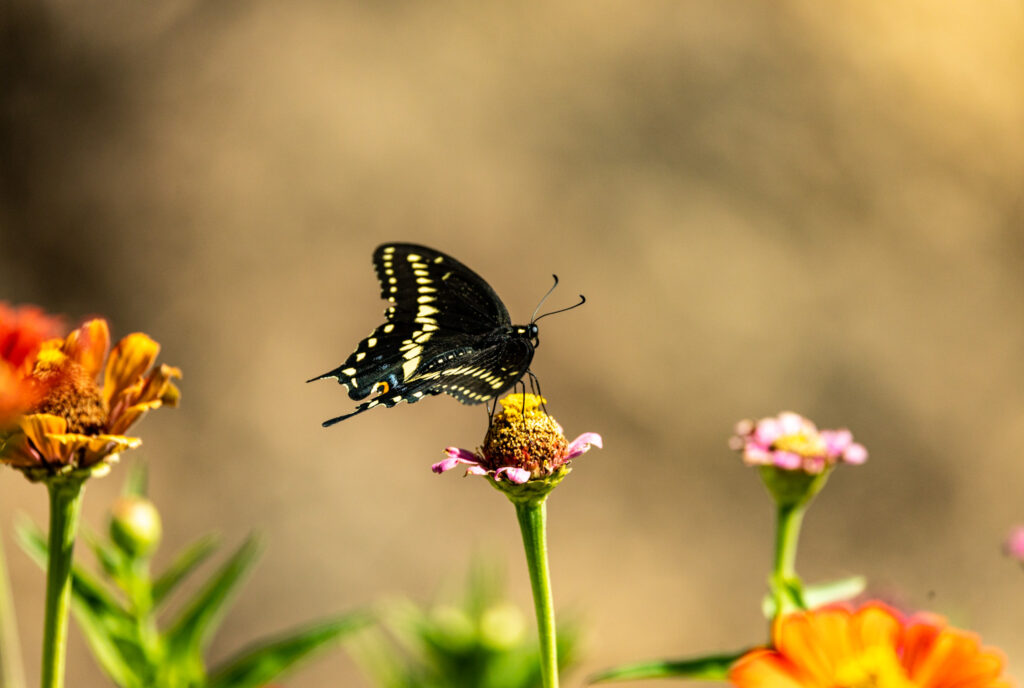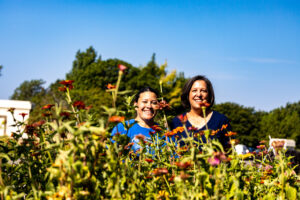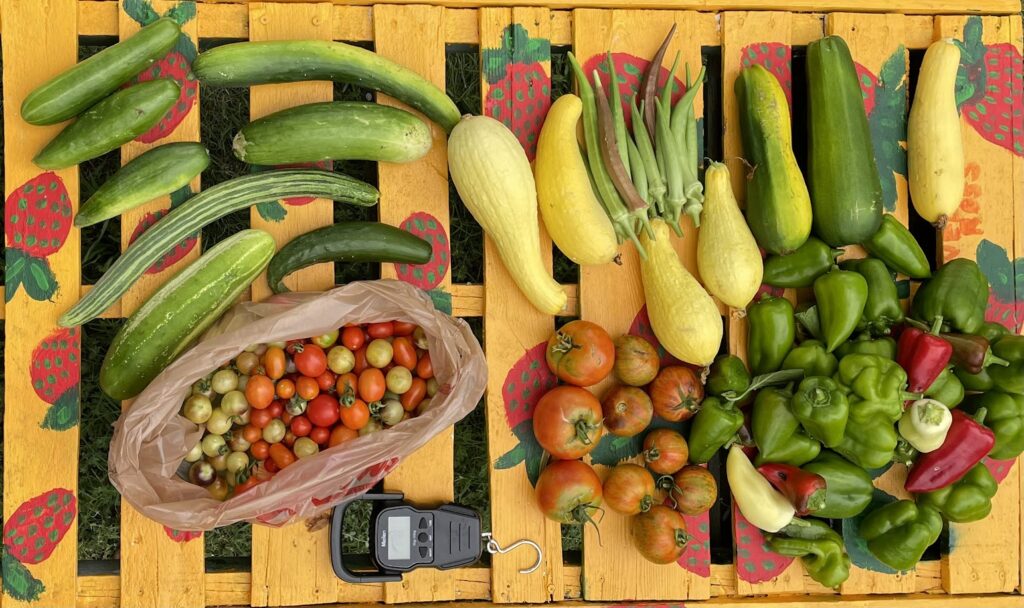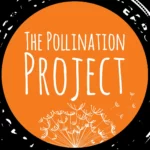Through pollination, bees provide one-third of the food we eat, The National Wildlife Federation.
“What concerns me the most is the state of things we are leaving for our children and grandchildren. We too often make decisions that are short-sighted and only good for us personally, not necessarily good for the environment. But I am hopeful because many young people are concerned about the environmental issues we have created for them. And if anyone can figure out how to create a good future for us all, it is our young people,” Kris Rogers, Riverside Pollinator Project.
There are special places that make us feel free and at peace. Those places remain in our memories no matter how much time goes by. They are embedded in our hearts as gates to happiness. For Kris Rogers, that place was her grandmother’s garden in Gresham, Nebraska, a joyful surrounding that has inspired her to create a lovely space for her community as well as a much-needed safe haven for pollinators.
How to Help the Pollinators
Bees are not the only animals who have the crucial activity of pollinating plants, according to The National Wildlife Federation. There are over 100,000 invertebrates and over 1,000 mammals, birds, amphibians, and reptiles that are a part of this process. However, bees have a special place in this category because they provide one-third of the food we consume.
Unfortunately, pollinators are diminishing around the world – but we have the power to change that. One thing we can all do in order to help them survive is to plant native trees, bushes, and flowers that can provide the nourishment they require in our yards and communities, indicates The National Wildlife Federation.
“There is a real awareness that if we don’t step in and plant what the insects and birds need, it is not going to be sustainable for them in the long run,” says Kris, who is currently working to make this happen with neighbors and friends in a community garden in Wichita, Kansas.

For the Love of Nature
Kris is a former educator, devoted to community service and helping people amplify their own voices. She is married to Lynn Rogers, a former agricultural banker, who has devoted his life to statewide public service, and her family includes 5 adult children, three grandchildren, and their pets.
 She studied Elementary Education at the University of Nebraska and worked as a third-grade teacher. Now, she serves on the board of a branch of the YMCA, as well as that of a small retirement community. In addition, she is working with the Riverside Garden, a community garden in her neighborhood, and the development of Wichita Community Gardens Inc., a nonprofit dedicated to fostering sustainability of the urban community and natural environment.
She studied Elementary Education at the University of Nebraska and worked as a third-grade teacher. Now, she serves on the board of a branch of the YMCA, as well as that of a small retirement community. In addition, she is working with the Riverside Garden, a community garden in her neighborhood, and the development of Wichita Community Gardens Inc., a nonprofit dedicated to fostering sustainability of the urban community and natural environment.
Her love for nature, the environment, and gardening came early in life. She grew up on a farm in the small town of Gresham, Nebraska. Her grandmother lived just across the road and Kris would visit her often.
“My grandmother’s yard was full of things we didn’t have in our garden. She had a cherry and an apple tree, berry bushes, an apricot tree, and rhubarb. Being in her garden was an exceptional experience because I was welcomed to taste and enjoy. I think that is the place that really fostered my love for nature and gardening,” recalls Kris. “The shady area – where the fruit trees were – felt almost like a sanctuary to me. I could wander into this spot and there was always something new to see. Life moved at a slower pace there. It was a really healthy place for me.”
And this wonderful feeling, along with helping the pollinators, is what Kris and her friends work to recreate in the Riverside Garden.
Riverside Community Garden
Riverside Garden started in 2016 after a house burned down in Kris’ neighborhood, creating open space.
“My interest in neighborhood gardening germinated during an unexpected encounter with a neighbor who was interested in turning the vacant lot into a garden,” remembers Kris. “I was nearing the end of cancer treatment and looking for a place to invest my energy. I was interested in the challenge and a return to my rural roots, so I agreed to help support and execute the concept and discovered the beauty of neighborhood initiatives in a very personal way. Four years later, as the pandemic was keeping everyone close to home, the garden became a place of healing and hope for gardeners and those who walked past daily to watch the changing seasons. Interestingly, it was the pollinator garden in the front of the property that was the draw for a neighborhood walking route, and my draw to the space, as well. Learning to plant natives was a meandering journey. But in the end, standing in a butterfly swarm and learning to make peace with bees and wasps was inexplicably transformative. Neighbors had the same experience as I did.”
By 2022, the Riverside Garden moved to another location that is two and a half times larger than the previous site.
“We really struggled to find a good spot for the garden, but the final result was very positive. It’s in a much more public place than what we were originally looking for–we are in a corner next to a botanical garden and a golf course. There are a lot of people who stop and visit the garden and this allows us to talk about what we are doing and why we are doing it,” says Kris.
The City of Wichita leased the land to the Riverside Garden and the payment required is the donation of 10% of their produce. The City also helps by paying for the water.
“We donate well over 10% of what we grew,” says Kris. “This year we donated almost 1,200 pounds of produce including tomatoes, okra, squash, tomatillos, cucumbers, peppers, cabbage, lettuce, sweet potatoes, eggplant, basil, and more. We are building on our experience from the past location, not only with successful food production and nurturing our community but also to invest in our pollinators.”

A Pathway for Pollinators
A visit with the president of the Native Plant Society opened Kris’ eyes to the possibility of creating pathways for native bees and other pollinators.
“Our neighborhood has wide swaths of grass in parkland on three of the four physical boundaries, with untapped potential. In a later conversation, she brought up the possibility of harvesting seeds to continue to create those pathways,” says Kris.
In order to achieve these pollinator pathways, the Riverside Pollinator Project was created with the intention of installing hundreds of plants in the easement of the community garden property, with the help of a network of gardeners. But Kris needed funds to make this happen.
“The person who oversees community gardens for the Extension Office Master Gardeners told us about The Pollination Project and recommended that I apply,” says Kris. “And when I looked into the grant, I was beyond excited because this work is near and dear to my heart and the grant made our project really tangible.”
Kris and her neighbors are also planning to create a pollinator pathway throughout her neighborhood.
“We have a lot of support from people who really know what they are doing. They have carefully chosen the plants we need. We want to have a plant share event because some of our neighbor bees can only travel a short distance, so in order to keep them fed and healthy we must have the plants that they need,” says Kris.
Her community is also invested in this activity. Her neighborhood association has donated money for plants to share with others. And in the last year, Grassland Groupies successfully lobbied the city to gain a Bee City designation from the Xerxes Society, and are spearheading the work of increasing pollinator plantings throughout Wichita.
Join Us
If you are inspired by this work and have an idea for a project that addresses an issue that you are passionate about, we’d like to invite you to submit an application and together we will build a better, more compassionate future!
If you would like to support the work of more heartivists like this around the world, please visit our donation page and be a part of the change today!


![Monica Wang, a graduate of Yantai University in China, founded Xiaobu Vegan to promote veganism in her homeland. Having grown up in Guangxi with little early connection to animals, her perspective changed after moving to Shanghai and working at Plant Based Consulting. Her vegan journey began alongside rescuing two cats and a Japanese Akita, Meng Meng.
Xiaobu Vegan, established in 2020, uses educational videos, restaurant collaborations, and initiatives like the "Vegan Challenge" to advocate for plant-based diets. Supported by The Pollination Project, the organization aims to influence dietary habits and encourage compassion through its growing platform.
Read more on our website👇
[https://thepollinationproject.org/would-you-eat-your-best-friend]
#xbvegan #vegan #veganchina #animaladvocacy #animalrights #compassion #china #heartivism @animalchangemakers](https://thepollinationproject.org/wp-content/plugins/instagram-feed-pro/img/placeholder.png)